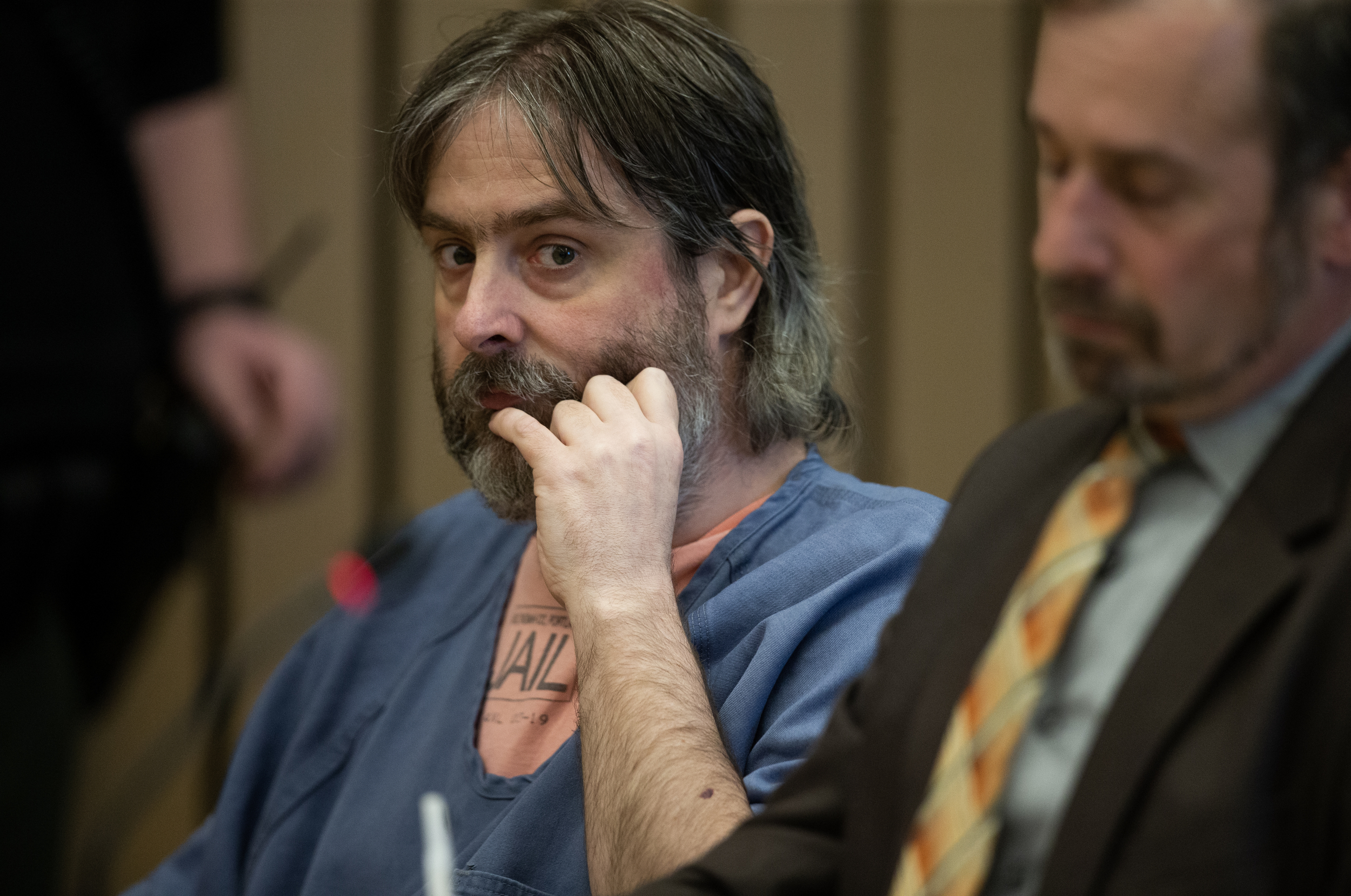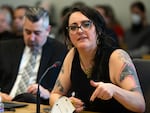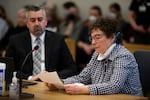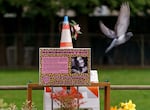
Benjamin J. Smith, 44, was convicted of second-degree murder and other charges during a sentencing hearing in Multnomah County Circuit Court on Tuesday, April 14, 2023.
Dave Killen / Pool photo via The Oregonian
The man who shot five people, killing one, near Northeast Portland’s Normandale Park last year was sentenced on Tuesday to life in prison with the possibility of parole after 55 years.
Benjamin Smith, 44, pleaded guilty to second-degree murder, four counts of attempted murder and four assault charges last month.
On Feb. 19, 2022, Smith walked out of his Northeast Portland apartment and started yelling at a small group of women preparing to help redirect traffic around a racial justice march. The women attempted to de-escalate the situation, but Smith drew a handgun, firing at them. Smith stopped shooting when an armed bystander returned fire, hitting Smith in the hip.

Dajah Beck, who was shot during a shooting at Normandale Park on Feb. 19, 2022, also recorded audio and video of the event. She played audio excerpts of that footage during her victim impact statement at Benjamin J. Smith's sentencing hearing in Multnomah County Circuit Court on Tuesday, April 18, 2023. Smith, 44, was convicted of second-degree murder and other charges and sentenced to life in prison.
Dave Killen / Pool photo via The Oregonian
Smith’s bullets killed a 60-year-old woman named June Knightly and injured four others. Several survivors of the shooting provided victims’ statements at Tuesday’s sentencing hearing before Multnomah County Circuit Court Judge Christopher Marshall.
“I am deeply impacted from the trauma of that night,” said a woman who identified herself as Deg.
Deg, who called in remotely to testify, was paralyzed from the shoulders down by the shooting and needs a ventilator to breathe.
“The majority of my coping skills are no longer accessible,” Deg said. “I used to love to sing. And I really miss the sound of my laugh.”
Deg’s mother, Leslie, said that the financial burden to take care of her injured daughter has been significant. She’s paid over $120,000 to renovate her home to make it accessible to Deg and $60,000 for a wheelchair-accessible van. Leslie and her husband are in their 60s and retired, and serve as their daughter’s main caregivers. She said she worries about what that means for Deg’s future.
“How long will we be able to care for our daughter?” Leslie said. “What happens if we’re no longer able to?”
OPB highlighted Deg’s story and those of other women who survived the shooting in a story published earlier this week.
Smith sat in silence in a wheelchair next to his attorney as the women spoke.
Allie Bradley, who Smith shot four times, told Smith his actions have forever marred her life.
“The weight of your bullets have not left my body,” Bradley said. “I thought I was going to die. But you couldn’t steal my strength even when you tried to kill me.”

Leslie, no last name given, mother to a person paralyzed in the mass shooting at Normandale Park on Feb. 19, 2022, reads a victim statement during a sentencing hearing in Multnomah County Circuit Court on Tuesday, April 18, 2023. Benjamin J. Smith, 44, was convicted of second-degree murder and other charges and sentenced to life in prison.
Dave Killen / Pool photo via The Oregonian
Several who spoke said Smith’s shooting should serve as an example of what can happen if people with a history of making violent threats aren’t stopped sooner. In the years leading up to the shooting, Smith was reported numerous times to law enforcement for making threats online. That included a threat assessment conducted by the FBI, which said it spoke with Smith in 2021. The FBI did not investigate further.
Dajah Beck, a woman who Smith shot in the chest and arm, used her time in court to play a portion of the audio captured by a GoPro camera attached to her motorcycle helmet the night of the shooting.
“I’m playing this for the world that averts its eyes from political extremism and vigilantism like this,” Beck said before playing the clip.
The recording captured the moments directly after Smith shot at the group, including screams for help from those injured. Beck’s video was the key piece of evidence in the prosecutors’ case against Smith.
Smith declined to speak. His court-appointed attorney, Jonathan Sarre, said that Smith, “Does not believe that he can express the unfathomable remorse that he has for these folks.”
Several shooting survivors expressed their anger with this decision.

A memorial for June “T-Rex” Knightly, at the corner of Northeast Hassalo Street and Northeast 55th Avenue in Portland on April 5, 2023. Knightly died after being shot by Benjamin Smith on February 2022.
Kristyna Wentz-Graff / OPB
“Nothing?” Beck asked Smith, before quickly leaving the courtroom. “You got nothing?”
Several members of the public who were watching the hearing shouted “Coward” and “Seriously?”
Smith did not appear to react.
Marshall, the judge, did not address Smith directly when announcing the sentence, which doesn’t allow Smith the opportunity of parole for at least 55 years. Marshall also reserved $58,000 in restitution for the victims through the state’s Crime Victims’ Compensation Program.
Marshall thanked those who spoke on Tuesday and encouraged them to continue using their voices to speak out.
“Obviously no one should ever have to be here for something like this,” Marshall said. “There is nothing that the court or the criminal justice system can do to change what has occurred here or make anything that has happened any righter than it is.”


